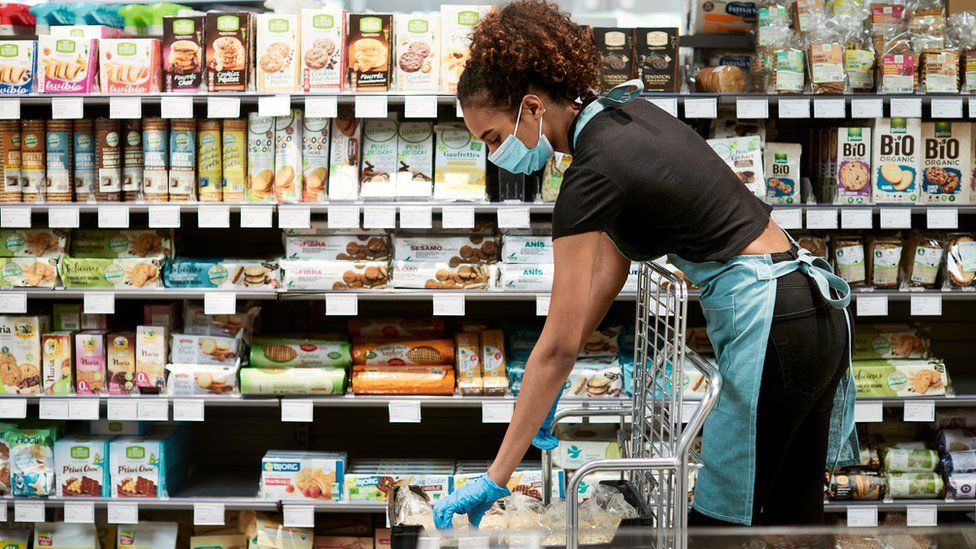
Key parts of the food industry will be allowed to do daily Covid testing from Friday instead of asking staff to self-isolate.
The government said daily testing would be implemented at key sites, such as supermarket depots and food manufacturers.
Close to 10,000 staff at 500 sites in the UK will eventually be affected.
It comes as supermarket bosses warn of severe staff shortages after thousands received alerts to self-isolate.
Supermarkets said the supply of some products was being affected by the “pingdemic” keeping staff away from work, as a record 618,903 people were told to self-isolate by the NHS Covid app in England and Wales.
While some retailers said they may have to close stores, they downplayed fears of food shortages, saying the problems were not widespread.
The new daily contact testing measures will begin at 15 supermarket depots from Friday, followed by 150 depots next week, but it will not apply to supermarket store staff.
It will mean depot workers who are alerted by the app or contacted by NHS Test and Trace will be able to continue working if they test negative, whether or not they are vaccinated.
Helen Dickinson, chief executive of the British Retail Consortium, said “disruption is limited at the moment” but it was vital that the government rolls out the scheme as fast as possible and is prepared to take further action if necessary.
In a separate development, other key industries will also be allowed to deploy daily Covid testing instead of self-isolation for a limited number of essential workers who are fully vaccinated.
This scheme covers sectors including transport, emergency services, border control, energy, digital infrastructure, waste, the water industry, essential defence outputs and local government.

‘Shoppers should feel reassured’

This intervention should alleviate genuine concerns in the food industry about supplies. Hundreds of designated sites – supermarket depots and food manufacturers – will be able to administer the tests that will enable workers to skip the need for self isolation.
This will be the case whatever the vaccination status of the worker. It is not sector-wide and will not, for example, apply to actual supermarket stores.
But it should be enough to stop some of the sporadic shortages become a systemic issue. Shoppers should feel reassured.
More generally the help in other sectors is limited.
The government clarified that the scheme announced earlier this week to allow named double-vaccinated workers approved by letter to avoid isolation will apply to 16 sectors from energy to waste to medicine and essential transport.
The bar is high. The government is trying to keep the Test and Trace system intact as a second line of defence against the pandemic. It is as tricky a balancing act as it has always been.

Hannah Essex, co-executive director of the British Chambers of Commerce, said that while the announcement would be a relief to some businesses, “it will leave many more still facing critical staff shortages and lost revenue as the number of people being asked to isolate remains high”.
CBI director general Tony Danker agreed, warning: “The current approach to self-isolation is closing down the economy, rather than opening it up.”
Businesses have already exhausted contingency plans to get in extra staff and are “at risk of grinding to a halt in the next few weeks”, he added.
Scotland has also launched a system of exemptions from self-isolation, covering workers in sectors such as health and social care.
Environment Secretary George Eustice said: “We recognise there are some absences in the food supply chain so what we’re announcing is for the top four hundred or so sites, things like supermarket depots, and some of the key food manufacturers.
“We’re going to change the system, and enable them to test and return to work, so somebody who is contacted in future by test and trace or is pinged will be able to have daily contact testing for seven days and be able to carry on working, provided their tests remain negative.”
Mr Eustice added: “We’re still concerned about the level of hospitalisations, so we want to do what’s necessary to get the food supply chain working, but at this stage not go as far as including those stores.”
